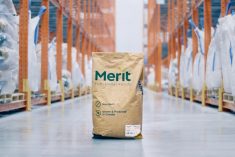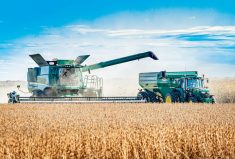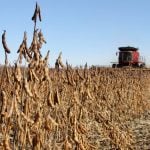Canadian farmers who have repayment deadlines coming up on their cash advances between now and the end of April will get extra time to repay those loans.
The federal government on Monday announced a stay of default on loans coming due on or before April 30 under the Advance Payments Program (APP), among other measures it’s taking against the financial impacts of the COVID-19 pandemic.
The APP extensions, which affect up to $173 million in deferred loans, are meant to provide farmers with flexibility in managing cash flow against lower commodity prices or “reduced marketing opportunities,” the government said.
Read Also

U.S. grains: Soy futures post biggest monthly gain in nearly five years on China trade optimism
U.S. soybean futures climbed to a 15-month high and posted their biggest monthly gain in nearly five years on Friday following a rally fueled by the prospect of revived exports to China.
The deadlines for repayments of 2018 cash advances for grains, oilseeds and pulses, and for cattle and bison, are now reset to Sept. 30, 2020. The deadline on repayments on 2019 cash advances for flowers and potted plants has also been reset, to Oct. 31, 2020.
Also, farmers who still have interest-free APP loans outstanding will be able to apply for an additional $100,000 interest-free portion for 2020-21, the government said — as long as their total APP advances remain under the $1 million cap.
Farmers looking for more information are asked to contact their APP administrators.
APP administrators taking part in the stay include the Alberta Sugar Beet Growers, Alberta Wheat Commission, B.C. Breeder and Feeder Association, Canadian Canola Growers Association, Manitoba Corn Growers Association, Manitoba Livestock Cash Advance, Western Cash Advance Program, P.E.I. Federation of Agriculture and Agricultural Credit Corporation, the government said.
Lending capacity
The government on Monday also pledged $5 billion for an expansion to the “capital base” at Farm Credit Canada, to boost the “lending capacity” of the federal farm, agrifood and agribusiness lender.
Added lending capacity for FCC — whose loan portfolio today sits at over $38 billion — will provide “increased flexibility to farmers who face cashflow issues and to processors who are impacted by lost sales,” the government said.
FCC plans to “use its resources to find solutions that offer the best chance for recovery going forward so the industry emerges stronger,” the lender said in a separate release Monday.
“Initially, the focus will be on assisting the industry in addressing cash flow challenges so that businesses can remain focused on business-critical functions rather than worrying about how to access funds to keep operating through this difficult time.”
Ag sector support “will also take strong collaboration between banks, credit unions, FCC and other financial institutions,” FCC CEO Michael Hoffort said in the same release, adding the lender “will be working in partnership with other financial providers.”
Existing FCC customers with cash flow or other financial concerns are asked to contact the organization “to discuss alternatives” such as loan payment deferrals or other products.
“Each business’ financial situation is unique, so there may be a combination of options considered,” Hoffort said. “The sooner we can discuss potential challenges, the more options we have.”
‘First step’
Todd Lewis, president of the Agricultural Producers Association of Saskatchewan (APAS), welcomed Monday’s announcements as “a good first step to help spring seeding move forward.”
More must be done in coming weeks, he said, as Saskatchewan farmers’ net farm incomes have dropped by over 40 per cent in the last two years and the current pandemic is creating “unprecedented business instability” going into this production year.
Current business risk management (BRM) programs, he said, “do not provide us with an adequate financial backstop needed to manage these risks.”
Jeff Nielsen, chair of Grain Growers of Canada, reacted to the FCC announcement on Twitter, saying it’s “fair to say farmers do not want more debt” but rather need “BRM programs that work” and “assurances to our international customers that we can get our products to port.”
Nielsen also asked on Twitter whether there would also be federal relief for producers who instead have loans or lines of credit from commercial banks or local credit unions. — Glacier FarmMedia Network, with files from D.C. Fraser and Allan Dawson












